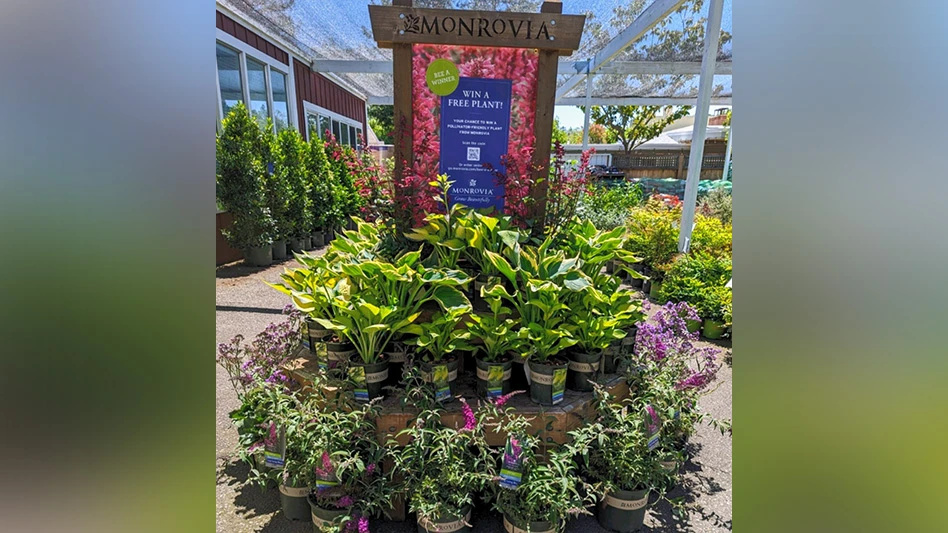 In most customers’ eyes, edible gardening is a task for late spring and early summer. They make their annual trip to the local garden center or big box store, purchase the plants, tools and soil that they need, and many don’t return.
In most customers’ eyes, edible gardening is a task for late spring and early summer. They make their annual trip to the local garden center or big box store, purchase the plants, tools and soil that they need, and many don’t return.
Garden Center spoke with Jennifer Hatalski, winner of last year’s annual OFA Short Course merchandising contest and former general manager of Varsity Garden Center in Swoyersville, Pa., about the best ways to promote edibles within your store and create repeat customers who return month after month.
Classes
Classes are an obvious, yet often undervalued, method of creating return customers. Hatalski recommends setting up a comprehensive class schedule early in the year, and holding classes at the beginning, middle and towards the end of the season. It’s imperative to begin a consistent marketing campaign for the classes soon after scheduling them.
|
7 tips to keep customers coming back
|
With regards to the timing of classes, “In the beginning of the season, you should schedule your bare root fruit classes, and get customers in before the middle of March,” Hatalski suggests. “It’ll get everybody to start thinking about edibles and get them energized and ready to go.” Garden centers should also take into consideration when they will recieve their stock. It could prove more detrimental than helpful to hold a class before the supplies discussed have arrived at the store. For the other crops with a shorter maturation period, such as beans, garden centers can host classes later, in April or May.
Holding a succession planting or garden planning class is another early season possibility. At a succession planting class, you can help customers create a schedule for their garden that involves multiple plantings throughout the season. Gardeners would need to plant colder-weather crops like carrots by mid-April or so, says Hatalski, so a mid-March class would be appropriate to give them plenty of time to plan out their gardens and get these first crops in the ground.
This type of class is advantageous in many ways. First, it increases the number of customers in your store during the class itself. They are more likely to purchase tools, seeds and other items if they have a well-planned strategy, like the one that they develop in this class. Additionally, it is a way to capture customer information that will help you continue to promote edibles to them throughout the season.
Hatalski suggests making a copy of each gardener’s succession planting list as well as collecting their contact information, in order to send them emails or postcards throughout the season to remind them to come back in for the next set of edibles. “If they walk away with that list themselves, chances are they’re going to lose it, and forget about it,” she explains. “But if you have a way to copy their shopping list and send it back to them, they’ll really think about coming back in.”
Another suggestion Hatalski offers is to have giveaways or small takeaways for students. Perhaps you could raffle off an Earthbox or a free flat of edibles to one of the students who completes the garden planning class. On a smaller scale, the prize could be seed packets that all participants receive at the end of class. These sorts of takeaways are mutually beneficial — the winner may come back into the garden center looking for fertilizer, containers or tools to go along with their prize.
Events
Besides classes on how to grow edibles, garden centers should consider hosting events, such as a ladies’ night, as a way to promote edibles. The event could include music, food, appetizers and wine, and have demonstrations of different cocktails that can be created with the herbs they’re growing in their kitchen or backyard. Because of different health regulations, it may be easier to bring in an outside group, such as a winery, to provide the food and drink.
The possibilities are endless when it comes to events. Hosting a farmers market with the participation of local businesses, or a charity event for a local food bank or other organization, are other ways to get customers more involved.
 Displays
Displays
When it comes to edibles displays, the most important thing is to keep them fun, welcoming and fresh. “You want to have fresh displays, because when you go into the grocery store, you’re not going to buy lettuce that’s brown, or fruit that’s bruised,” explains Hatalski. “It’s the same thing when you buy edibles as plants. People won’t buy a plant that’s bruised or just doesn’t look good.”
She notes that with edibles, store owners don’t necessarily need all of the extra decorative display elements that he or she would normally use to create a plant or flower display; they must be attractive to the customers. As with other plants, it’s also vital to have clear signage, uncluttered aisles and well-maintained displays to promote sales.
Employee training and customer service
Customers aren’t the only ones who benefit from being well-versed in edible gardening. Garden center retailers should invest in their own employees’ education as well. Perhaps one of your employees or a local master gardener specializes in edible gardening, and could share his or her knowledge with newer employees. Customers whose questions are answered by your staff members are more likely to return to the store for future edible gardening needs.
In addition to traditional horticultural classes and workshops, developing and maintaining an on-site test garden is beneficial for employees, even if space is limited. If available square footage is an issue, what better way to showcase the new stock of containers for small-space edible gardening than in an employee-maintained test garden? No matter the size, employees will get excited about what they’re growing, and share this excitement with customers.
Educated employees who lack in customer service skills are not nearly as effective. One of the advantages that IGCs have over the “big box” stores is the opportunity to provide customers with a more personalized experience. Many customers are intimidated by growing their own fruits and vegetables, and can be reassured by knowledgeable and personable employees.
Hatalski recounts one mother who came into the garden center last year, looking for a way to feed her eight children a healthy, affordable diet that included fresh fruits and vegetables. “She told me that it was way too expensive to go to the grocery store anymore,” Hatalski remembers. She asked Hatalski for assistance in growing her own vegetables: what to plant, when to plant and how to take care of them. “I held her hand all season,” says Hatalski. “We started early and she came back probably every single week and said ‘I can’t believe I grew something, and had enough to feed my whole family.’” If the mother had chosen to visit a larger store, she likely wouldn’t have received the individualized attention, advice and helpful knowledge that only an independent garden center can offer.
Edibles vs. flowers
There are a few key differences when it comes to marketing edibles as opposed to flowers and other plants. The first point to remember is that many customers have the impression that edible gardening is difficult, and requires skills that they may not think that they possess, whereas flowers are more self-sufficient. This is where having well-educated staff members who can explain the process, and hosting classes is useful.
 Emphasize that edibles can be cultivated in small spaces, such as in containers or window boxes. Emphasize that edibles can be cultivated in small spaces, such as in containers or window boxes. |
Another aspect to emphasize to customers is that, like flowers, edibles can also be cultivated in spall spaces, such as in containers, window boxes, or even upside-down planters. This is an especially important point to make, especially for younger customers, who aren’t necessarily living in their own home yet, and don’t have the space to create a larger garden. For them, container gardening is the answer.
Edibles and flowers can also be marketed together, as many can be grown together in containers. “There’s a lot that you can put together,” comments Hatalski. “You don’t have to think of it as just edibles and just flowers. If you don’t have a lot of space, you can combine them.” For example, edible nasturtiums can be planted in a container along with an assortment of different flowers.
Wrapping up the season and planning for next year
As the edible gardening season winds down, and the weather cools, retailers can still encourage gardeners to keep coming in for visits. For those who attended the succession planting class early in the season, it may be time to plant garlic and other cooler weather crops, and a reminder email or postcard may be in order. Also, don’t underestimate the power of a photo contest, or informal garden party for customers who’ve been gardening with you all season.
“You can even have a little competition going on throughout the summer, such as who can grow the largest pumpkin,” says Hatalski. “Tell your customers to take pictures — they get so proud and empowered.” She also suggests creating a board in the store or on the garden center’s social media page for people’s gardening pictures, whether it be a close-up of their prized hot peppers or their 10-year-old digging in the dirt.

Explore the June 2012 Issue
Check out more from this issue and find your next story to read.
Latest from Garden Center
- This Florida garden center's busiest days are in the fall, not spring. Find out how they do it
- Terra Nova Nurseries releases new agastache variety, 'Peach Pearl'
- The Certified Shopify Online Garden Center provides local retailers with ecommerce tool
- Meet the All-America Selections AAS winners for 2025
- Endless Summer hydrangeas and Suntory Senetti glam up Grammys red carpet
- Ball Seed releases 2025 edition of 'Thrive and Flourish' for landscape and garden retail
- American Floral Endowment's Fred C. Gloeckner Foundation Research Fund accepting grant proposals
- Floral Marketing Fund and CalFlowers partner to advance floral industry





